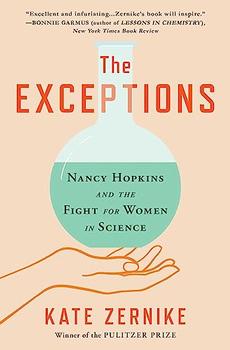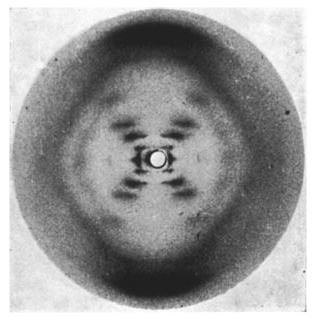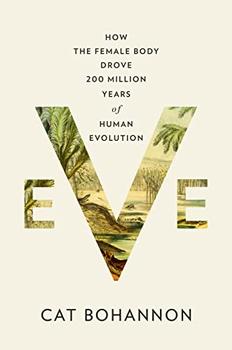Summary | Excerpt | Reading Guide | Reviews | Beyond the book | Read-Alikes | Genres & Themes | Author Bio

Nancy Hopkins, MIT, and the Fight for Women in Science
by Kate ZernikeFrom the Pulitzer Prize–winning journalist who broke the story, the inspiring account of the sixteen female scientists who forced MIT to publicly admit it had been discriminating against its female faculty for years—sparking a nationwide reckoning with the pervasive sexism in science.
In 1999, the Massachusetts Institute of Technology admitted to discriminating against women on its faculty, forcing institutions across the country to confront a problem they had long ignored: the need for more women at the top levels of science. Written by the journalist who broke the story for The Boston Globe, The Exceptions is the untold story of how sixteen highly accomplished women on the MIT faculty came together to do the work that triggered the historic admission.
The Exceptions centers on the life of Nancy Hopkins, a reluctant feminist who became the leader of the sixteen and a hero to two generations of women in science. Hired to prestigious universities at the dawn of affirmative action efforts in the 1970s, Dr. Hopkins and her peers embarked on their careers believing that discrimination against women was a thing of the past—that science was, at last, a pure meritocracy. For years they explained away the discrimination they experienced as the exception, not the rule. Only when these few women came together after decades of underpayment and the denial of credit, advancement, and equal resources to do their work did they recognize the relentless pattern: women were often marginalized and minimized, especially as they grew older. Meanwhile, men of similar or lesser ability had their career paths paved and widened.
The Exceptions is a powerful yet all-too-familiar story that will resonate with all professional women who experience what those at MIT called "21st-century discrimination"—a subtle and stubborn bias, often unconscious but still damaging. As in bestsellers from Hidden Figures to Lab Girl and Code Girls, we are offered a rare glimpse into the world of high-level scientific research and learn about the extraordinary female scientists whose work has been overlooked throughout history, and how these women courageously fought for fair treatment as they struggled to achieve the recognition they rightfully deserve.
Chapter 1
An Epiphany on Divinity Avenue
It was hard to deny the promise.
It was the second Tuesday in April 1963. Midmorning sunshine splashed the campus of Harvard University, where the trees were budding, and students were just back from a weeklong midsemester break. A Harvard man was in the White House, the youngest man ever elected president of the United States, heralding the dawn of a New Frontier. And here in Cambridge the next generation of ambitious young minds set out in crisp air along the tree-lined paths of the nation's oldest university, any of them on the way to do—it could be me—the next big thing.
At eleven o'clock, just north of the wrought-iron gates of Harvard Yard, and just east of the grounds where George Washington had once assumed control of the Continental Army, some 225 undergraduates, many in jackets and ties, filed down the gentle slope of a lecture hall to hear from a professor leading a revolution for the twentieth century. Five months ...
As uplifting as the ending is, this book can be frustrating for younger female readers. The constant self-blame and assuming that double standards were "the way it is" is difficult to accept...But, it's important to remember this isn't a clarion call for how things should be. This is a story of how things were, and the fact that some of the smartest, most accomplished women in the world could struggle to see feminism as anything other than "radical," and would have such deep faith in scientific meritocracy despite the contrary evidence, should reinforce for younger generations just how deep-seated and pernicious patriarchal ideas have been, even in living memory...continued
Full Review
(929 words)
This review is available to non-members for a limited time. For full access,
become a member today.
(Reviewed by Rose Rankin).
 Angela Duckworth, author of Grit
A story I wouldn't believe except that it's true, told by the reporter who broke it first. I'm embarrassed to say that I knew nothing about Nancy Hopkins before opening the cover of The Exceptions. Once I started, I couldn't stop. By the end, I thought, there is no stronger antidote to imposter syndrome than knowing someone like you was good enough all along--and that it is the rules that need to change, not the players.
Angela Duckworth, author of Grit
A story I wouldn't believe except that it's true, told by the reporter who broke it first. I'm embarrassed to say that I knew nothing about Nancy Hopkins before opening the cover of The Exceptions. Once I started, I couldn't stop. By the end, I thought, there is no stronger antidote to imposter syndrome than knowing someone like you was good enough all along--and that it is the rules that need to change, not the players. Janice P. Nimura, author of The Doctors Blackwell
Kate Zernike broke the end of this story for the Boston Globe in 1999. Now she goes back to tell it from the beginning, and even though you know how it turns out, you'll hang on every word. A blistering, brave, heartbreaking, and heartening account of brilliant women and the world-changing power of sisterhood and science.
Janice P. Nimura, author of The Doctors Blackwell
Kate Zernike broke the end of this story for the Boston Globe in 1999. Now she goes back to tell it from the beginning, and even though you know how it turns out, you'll hang on every word. A blistering, brave, heartbreaking, and heartening account of brilliant women and the world-changing power of sisterhood and science. Mahzarin R. Banaji, co-author of Blindspot: Hidden Biases of Good People
A gripping case study of the horrors and triumphs of the gender revolution in science. No matter who you are, be prepared to be transformed by the remarkable life and career of Nancy Hopkins and the MIT 16. The Exceptions will shock ('never again' you will repeat, every few pages); equally, it will instill hope from shining examples of the indomitability of the oppressed insisting simply on a life in science.
Mahzarin R. Banaji, co-author of Blindspot: Hidden Biases of Good People
A gripping case study of the horrors and triumphs of the gender revolution in science. No matter who you are, be prepared to be transformed by the remarkable life and career of Nancy Hopkins and the MIT 16. The Exceptions will shock ('never again' you will repeat, every few pages); equally, it will instill hope from shining examples of the indomitability of the oppressed insisting simply on a life in science. Siddhartha Mukherjee, author of the Pulitzer Prize-winner The Emperor of All Maladies and the #1 New York Times bestseller The Gene
What Nancy Hopkins achieved is exceptional—in science of course, but more broadly in society. What Kate Zernike has achieved in this brilliant book is also exceptional—a condemnation of the treatment of women in science and a riveting story about the drive to pursue science.
Siddhartha Mukherjee, author of the Pulitzer Prize-winner The Emperor of All Maladies and the #1 New York Times bestseller The Gene
What Nancy Hopkins achieved is exceptional—in science of course, but more broadly in society. What Kate Zernike has achieved in this brilliant book is also exceptional—a condemnation of the treatment of women in science and a riveting story about the drive to pursue science. The discovery of DNA is one of the greatest scientific achievements in the modern era, and possibly one of the most significant in history. The credit has long gone to James Watson and Francis Crick, who publicized the famous double-helix structure of DNA and the rest, as PBS notes, "is Nobel Prize history."
The discovery of DNA is one of the greatest scientific achievements in the modern era, and possibly one of the most significant in history. The credit has long gone to James Watson and Francis Crick, who publicized the famous double-helix structure of DNA and the rest, as PBS notes, "is Nobel Prize history."
The problem is this is an oversimplification at best and a rip-off at worst. Rosalind Franklin, an English female scientist, and her co-researcher Maurice Wilkins played a crucial role in the discovery of DNA's structure, but she was written out of that history until the late 20th century.
Franklin was born to a Jewish family in London on July 25, 1920, and she studied physics and chemistry at Newnham Women's College at Cambridge...
This "beyond the book" feature is available to non-members for a limited time. Join today for full access.

If you liked The Exceptions, try these:

by Melissa L. Sevigny
Published 2024
The riveting tale of two pioneering botanists and their historic boat trip down the Colorado River and through the Grand Canyon.

by Cat Bohannon
Published 2023
The real origin of our species: a myth-busting, eye-opening landmark account of how humans evolved, offering a paradigm shift in our thinking about what the female body is, how it came to be, and how this evolution still shapes all our lives today





